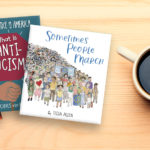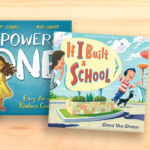Prior to 2020, the picture book world was already shining bright with all the starred reviews and other honors collected by two of the Fan Brothers—Terry and Eric—for their magical picture book collaborations The Night Gardener and Ocean Meets Sky. Then in September of 2020, they added even more luster by bringing another Fan brother on board. The Barnabus Project is a collaboration between Terry, Eric, and Devin Fan, and there’s clearly power in numbers: the book recently won Canada’s prestigious Governor General’s Award, along with a long list of other honors. But the Fan family wasn’t finished upping the star power—in January 2021, sister Larissa Fan stepped up with her own picture book, Ten Little Dumplings (illustrated by Cindy Wume), which has garnered its own starred reviews.
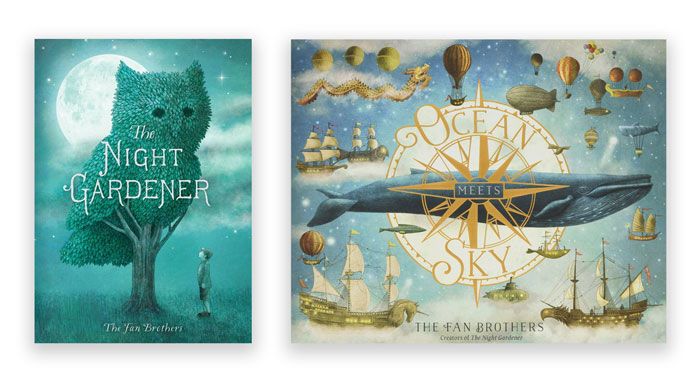
Here, all four of the phenomenal Fan siblings talk with Lisa Bullard about the shared influences that shaped them and their picture book creations, and celebrate the power of having siblings who serve as co-conspirators, co-creators, and cheerleaders.
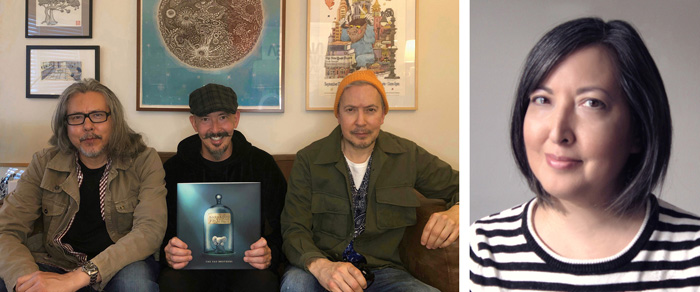
What a wondrous thing to have four siblings who have all published picture books! What was it about your upbringing that cultivated that kind of creativity?
Devin: I feel like we grew up surrounded by art and music.
Larissa: Our parents are both very creative. Our mother is a musician, so the house was always filled with music. Our father is an academic, but on the side, he’s an amazing potter. And the fact that we’re all artistic just made for a very creative environment.
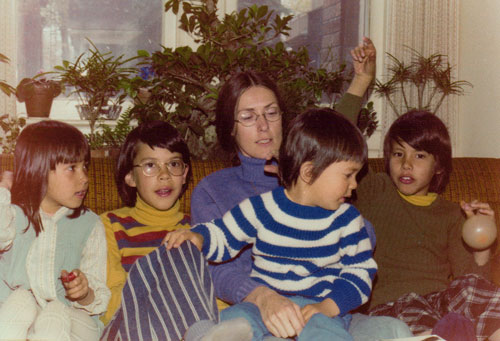
Terry: I think our imaginations were also nurtured by our dad. He’s a wonderful storyteller and would think up stories that were an early form of “choose your own adventure,” where he would encourage our participation in shaping the story’s outcome. Our mom has always been our biggest cheerleader and helped Eric and me create our first picture book together when we were kids, which we drew in crayon. She carefully bound the book together and wrote out the text for us. It was her way of saying, “Your story matters, too.”
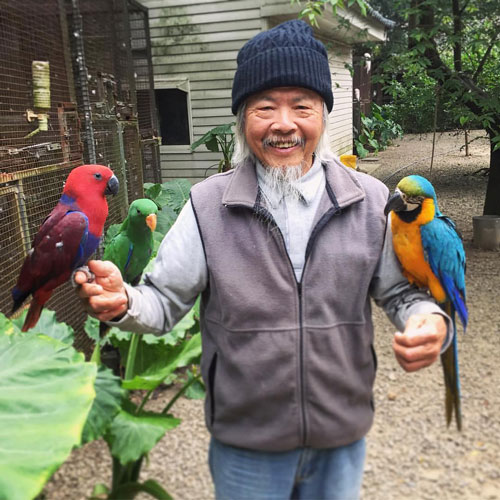
Enter to Win 1 of 5 Sets of Books by the Fan Family!
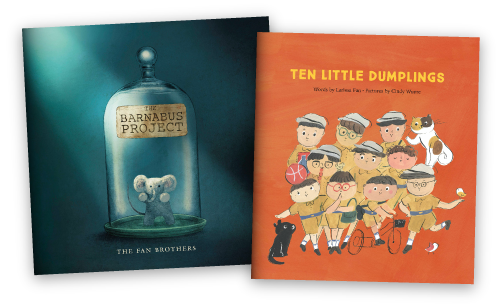
In what other ways has your family inspired your books?
Larissa: Ten Little Dumplings was inspired both by my father’s family (he really was one of ten brothers and one sister) and the Chinese folktale Ten Brothers. I also really wanted to capture the energy and landscape of Taiwan in the illustrations, and illustrator Cindy Wume was perfect for that because she grew up and still lives in Taiwan.
Terry: Being mixed race has given us a unique perspective, with both Eastern and Western influences, so I think that informs the type of stories we choose to tell and the way we approach those stories.

Being mixed race has given us a unique perspective, with both Eastern and Western influences, so I think that informs the type of stories we choose to tell and the way we approach those stories.” ─ Terry
The Barnabus Project features an “outsider/misfit” theme. And in the author’s note for Ten Little Dumplings, Larissa notes that she wanted “to write in someone who has been left out” of previously told stories. Are there things from your experiences growing up that inspired that shared concept?
Larissa: I think growing up mixed race at a time when that was less common probably gave us a bit of a feeling of being outsiders. And Terry, Eric, and I all went to high schools where the arts were not at all important. That made me feel separate from a lot of my classmates. The three of us are also naturally introverts, which can make things difficult in a society that champions extroverts. Devin is more outgoing!
Devin: I may be more outgoing now, but I went through years of being so closed in on myself that I could barely speak outside of the house. For me, that came from a place of self-doubt and isolation. Now when I do talks with children, my main priority is to try to build their self-esteem and acceptance of differences in themselves and others.
Eric: The Barnabus Project feels personal because I was a bit of a misfit growing up, especially in school. I was bullied in high school and didn’t really feel like I fit in anywhere until I went to art college, where I realized for the first time that there were other people like me. Suddenly, it didn’t matter if you were good at football or part of a popular clique.
Terry: I’ve felt like an outsider and a misfit for most of my life, so I can very much relate to Barnabus, and the book feels deeply personal. Like Eric, art college was the first place I felt accepted for who I was. My differences became an asset. I was surrounded by other misfits and creative types, and it felt like I had finally found my tribe.
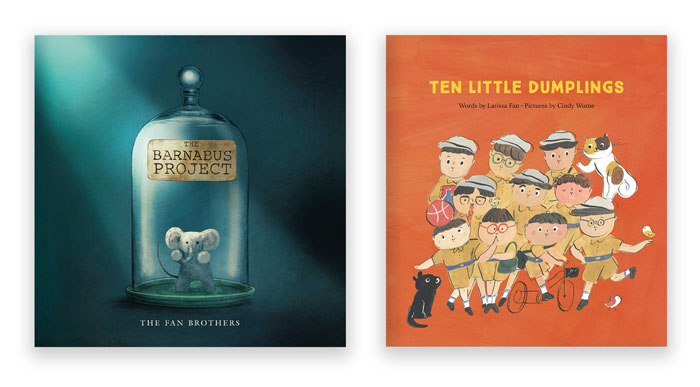
Now when I do talks with children, my main priority is to try to build their self-esteem and acceptance of differences in themselves and others.” ─ Devin
How does it change the collaborative process when you work with a sibling?
Terry: Eric and I have pretty much been collaborating on creative projects from childhood onwards. So, in that regard, it’s easier to collaborate because we’ve already established a system that works for us. When collaborating with both Devin and Eric, it went surprisingly well despite the complicated logistics. We all had such a consistent vision for The Barnabus Project that there was a continuous back-and-forth flow of ideas.
Eric: Personally, I’ve always liked being part of a “band” rather than a solo artist. It comes with its own challenges, but it’s nice having your talents buttressed by others.
Devin: I collaborate all the time at my work on projects, but I’m always careful to filter my thoughts and opinions before I voice them. With family, you don’t really have to do that. That ability, to be honest, is so important for the creative process.
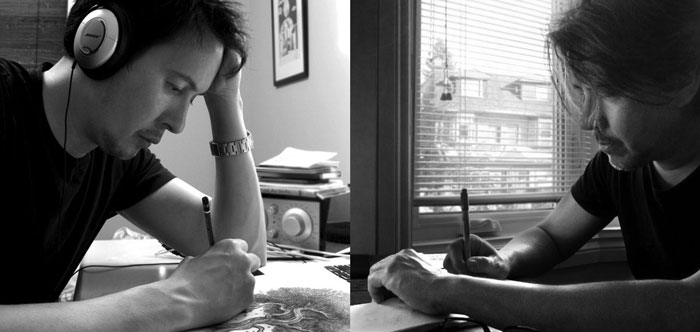
Personally, I’ve always liked being part of a “band” rather than a solo artist. It comes with its own challenges, but it’s nice having your talents buttressed by others.” ─ Eric
Do old family dynamics enter into your working relationships as adults?
Larissa: Haha! I haven’t collaborated with my brothers (yet!), but I definitely take Terry and Eric’s advice very seriously as more experienced older brothers.
Devin: Okay, I see how it is …
Larissa: Don’t be offended; you’re more like a co-conspirator.
Terry: Larissa, I would love to collaborate with you on something one of these days!
Larissa: Terry and Eric were always very close and did most things together, so that hasn’t changed. And they have a style of friendly bickering which has continued from childhood to this day.
Eric: The only enduring family dynamic is that we all want to see each other succeed and act as each other’s cheerleaders.
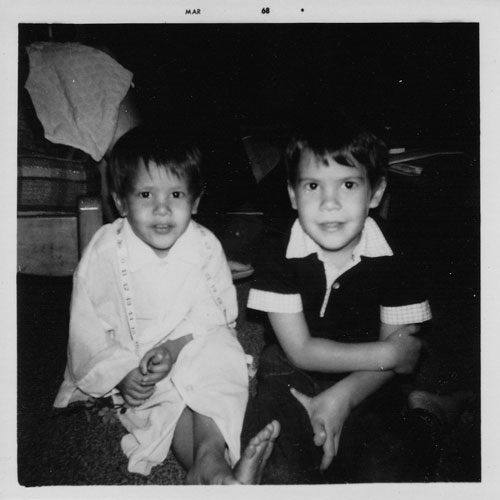
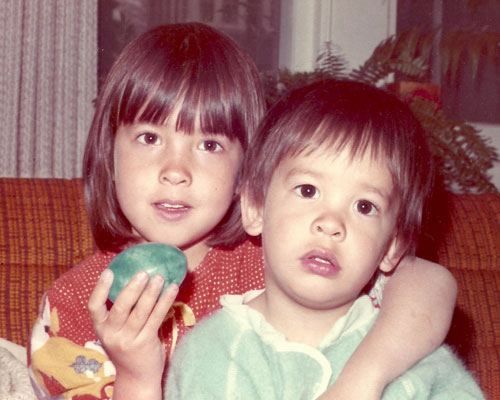
The sister in Ten Little Dumplings is an overlooked observer who has to search out her own place. That made me wonder about sibling rivalry. Do you ever wish your siblings had chosen to become accountants or nuclear physicists so that your creative work was a more individualized pursuit within your family?
Eric: It would be pretty cool having a physicist in the family, only because I’m so fascinated by science. An accountant to help me with my taxes wouldn’t be unwelcome, either. That said, it’s great being part of a creative family!
Larissa: My brothers have never been anything but supportive, so I honestly don’t feel any sibling rivalry. We often bounce ideas off each other, so I think that creative energy is fuel, more so than competition.
Terry: I’m so grateful to be part of such a talented, artistic family and could never wish for anything else. I derive tremendous strength and inspiration from them. We’ve all gone through some hard times, and I think this has created a strong, empathetic bond between us. As adults, Eric and I have had our individual accomplishments in the art world before doing the picture books, but our most significant achievements have come when working together.
My brothers have never been anything but supportive, so I honestly don’t feel any sibling rivalry. We often bounce ideas off each other, so I think that creative energy is fuel, more so than competition.” ─ Larissa
Speaking of working together, what can you tell readers about the next Fan Brothers picture book, which Fan fans will be thrilled to hear comes out September 28th?
Eric: It Fell from the Sky is about a strange object that falls into a garden one day. The object is an ordinary toy marble, but to the insects of the garden it’s a wonderful mystery. Each of them speculates about its origins and what it is, but it’s the spider who sees the potential to profit from it. In doing so, he eventually alienates his community and ultimately discovers that sharing is more rewarding than selfish materialism.
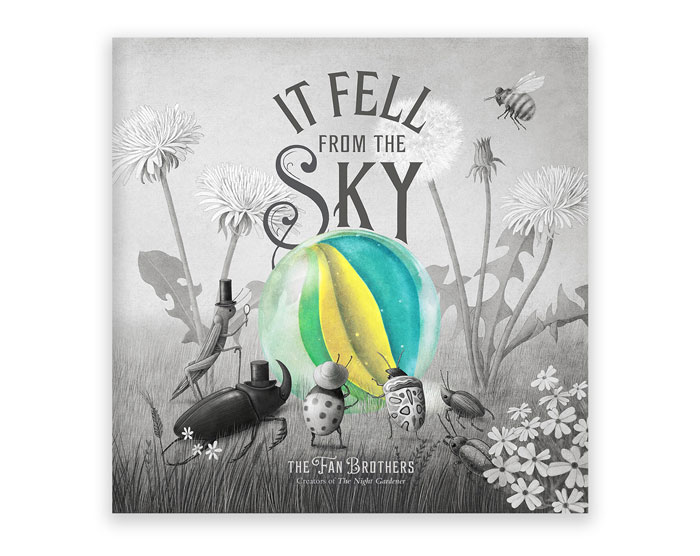
What’s the best way for readers to follow you on social media?
Larissa: https://www.instagram.com/larissa.fan/
Devin: https://www.Instagram.com/devin.fan.art/
Eric: https://www.instagram.com/ericfanillustration/
Terry: https://www.instagram.com/terryfanillustration/
Is there anything else you’d like to add?
Larissa: We all got into picture-book making in middle age, so I think we’re a reminder that it’s never too late to do something new.
Eric: Thank you for interviewing us! We’ve never been interviewed all together before, and I have to give my head a shake when I think about that and realize what a fantastic thing it is that all of us have published books out at the same time. I’m so happy and proud of my siblings.
The Fan Siblings Talk About Cultivating Creativity in the Classroom
Eric: I wish art and creativity were given more emphasis in school. Art is usually kind of an afterthought relative to other subjects, and the strange thing is, we’re surrounded by art and design in our daily lives: fashion, architecture, video games, the list is endless, and yet art is always considered somewhat frivolous in school.
Larissa: I think there are many opportunities to work in creativity throughout the curriculum, not just in designated art or music slots. It seems like a big effort is made to do this for younger children, but it decreases more and more as they get older. Personally, I’ve found that I connect to history much more through historical fiction than through dry academic texts.
Devin: I don’t think creativity needs to be cultivated. I think all children (and people, actually) have boundless creative energy; they need the materials and opportunity to express it. So far, doing readings and projects for Barnabus, I haven’t met a single child that didn’t want to create their own Perfect Pet or Failed Project.
Terry: In schools, art is never presented as a viable career option. This attitude puzzles me so much because in actuality, some of the highest-paid jobs out there are in creative fields. As Devin said, creativity and using one’s imagination are innate human characteristics. In many ways, it’s what defines us as a species. I think the value a society places on art is a true reflection of its priorities.





